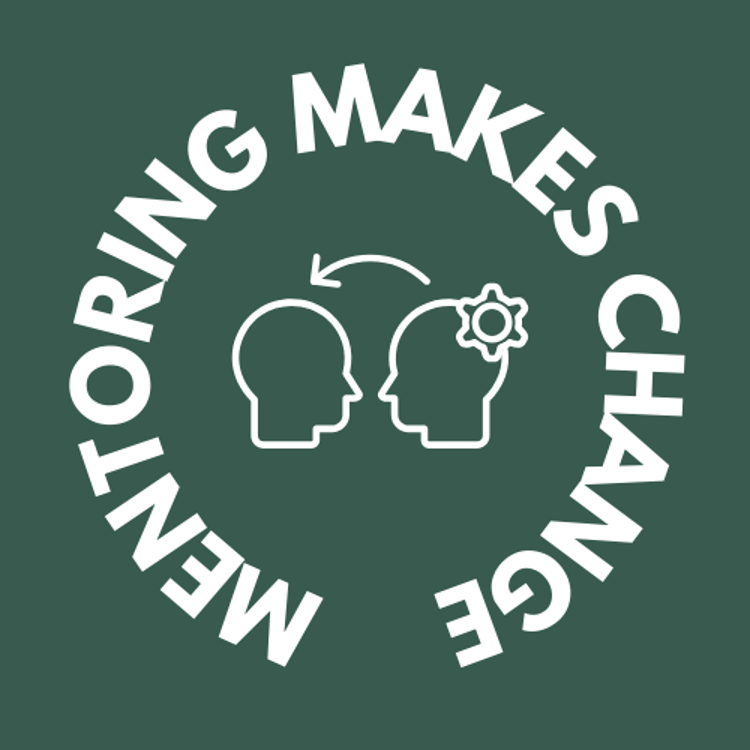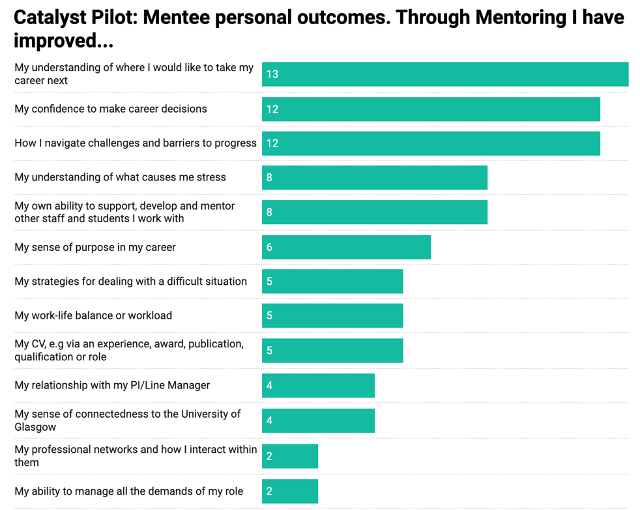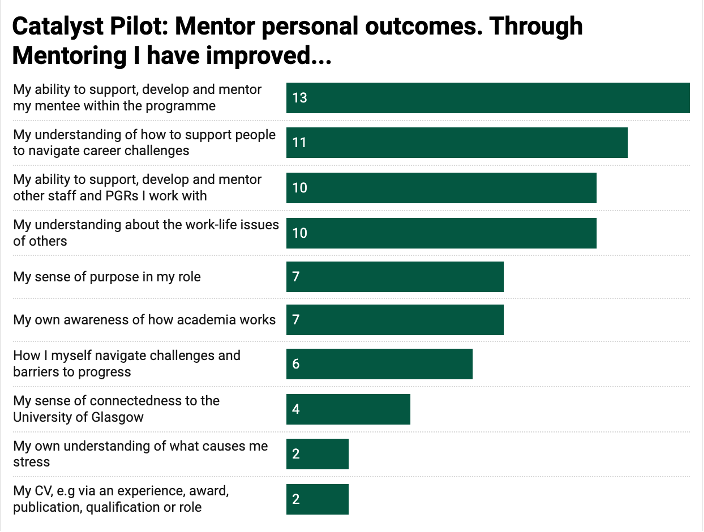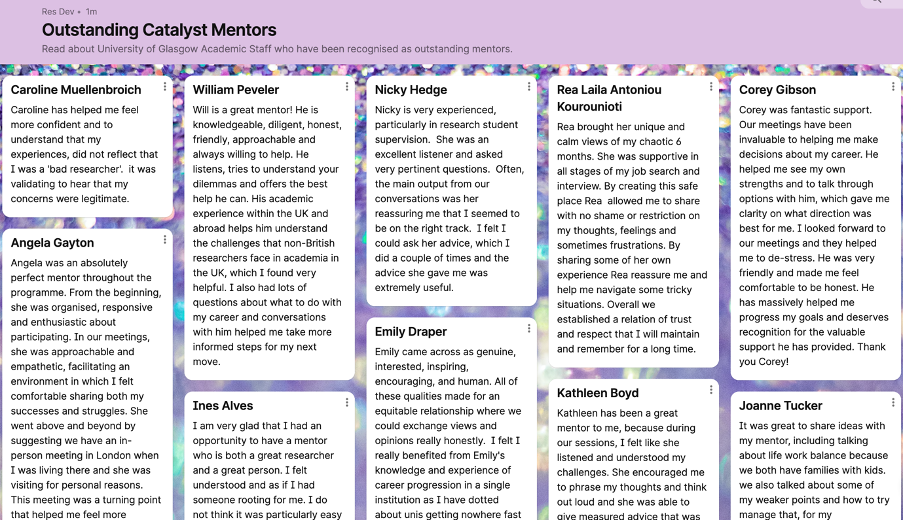By Dr Kay Guccione, Head of Research Culture and Researcher Development

The Concordat to Support the Career Development of Researchers (of which the University of Glasgow is an enthusiastic signatory) sets out our responsibility to develop both our Research Staff, and the Managers of Research Staff. And our latest pilot programme – Catalyst Mentoring – does both jobs in one.
When the Concordat says PIs should “Undertake relevant training and development opportunities so that they can manage researchers effectively.” – that doesn’t have to mean sitting in classroom-based workshops. Mentoring approaches like Catalyst can support PIs to learn valuable people development skills, and at the same time, make sure that those skills are immediately put to good work.
Catalyst Mentoring was designed to support Research Staff to access leadership development and career planning conversations through being matched with more senior academic staff, who provide ‘no strings attached’ guidance through collegial conversations. Mentoring leverages learning dialogue to enable mentees to take a deliberate and planned approach to career decision-making, focussing in on the personal objectives of the mentee.
Mentees: planning for the future
Evidence from our pilot of 20 mentoring pairs, shows that this programme does indeed support Research Staff in gaining self-awareness concerning how they relate to others, in gaining greater understanding of where they would like to take their career next, and in their confidence to make career decisions:
- I was looking for some tangible ways to shift my career trajectory in the direction I would like to go and my mentor helped me break down my long-term objectives into short-term actions while helping me think critically about the pros and cons of various paths. I found it helpful to hear about her experiences as an early career researcher (we agreed at our first meeting that some input from her would be welcome). I was also struggling with the nature of short-term contracts and how to plan for the future without knowing if my contract will be renewed. My mentor was empathetic about this issue, which helped me to feel comfortable speaking about it, and we discussed how I can make the best use of my time to prepare for multiple future scenarios.”
- “I was aiming to clarify what I really want, i.e., I knew I wanted to continue in academia (at least for a while), but also had concerns about whether to go for a permanent lecturer job or a fellowship or another postdoc. I was at a point of real uncertainty about what I wanted. I was also slightly unhappy with my isolation within the university. I think the conversations really helped and now I have a purpose. The conversations encouraged me to embark on a more exciting and challenging path of applying for a fellowship, which I am happy about. Ultimately I can say my expectations were well met.”
A summary of the spread of mentee personal outcomes is below, with the average number of positive outcomes being 4.5 per mentee.

Mentors: understanding their power to support others
There is also encouraging evidence that mentoring impacts on mentors’ (Academic Staff) perceptions of their power to help others, as well as building their confidence in the application of skills and techniques that are useful for their roles as PIs and supervisors, providing guidance and career support. Mentors report greater understanding of the power of a structured mentoring conversation, as well as feeling more in tune with work-life struggles of others, and gaining a better sense of ‘how academia works’.
Mentors were asked to comment as free text on a key takeaway from the mentoring programme as related to their own development. Selected comments are presented below:
- “The power of asking open questions, and watching how your conversation partner arrives at new insights through answering them – really empowering for both.”
- “Seeing how different people respond to and feel about similar situations. How people’s reactions/responses/motivation etc is very varied. Useful.”
- “How to avoid asking leading questions or always be giving advice! This has been a huge learning curve for me, and extremely helpful in other aspects of my work (especially PGR supervision).”
- “Confidence in my having something to contribute in support of junior colleagues even when my own experience and expertise is very different.”
- “Listening is hard, but so important.”
A summary of the spread of mentor personal outcomes is below, with the average number of positive outcomes being 5 per mentor.

Read examples of the positive impact of mentoring, via the Outstanding Catalyst Mentor board, where 43% of mentors in the pilot were named as having had transformative impact on their mentee – click the image below to read more.

Of course, a mentoring skill set, while being a great start, is not the only skill set PIs need. Our new PI development framework (announcement on this very soon) is taking a more holistic approach, and offering on demand resources, structured research leadership development programmes through Talent Lab*, a micro-podcast, and yes, a series of compact discussion-based workshops covering matters from managing challenging conversations, to running effective research group meetings.
A letter to all PIs
Developing your Research Staff doesn’t have to come at a great cost to you, in fact it has tangible benefits to you such as a more motivated, more confident colleague, working alongside you through a stronger trust-based working partnership. Research Staff are smart, capable, well qualified, and very highly skilled people and a lot of the PI’s role as a manager is often simply to encourage, elevate, include and support them to excel. Learning to deliver a conversation that unlocks new ways of relating to each other in professional and career development work, could be the ideal way to supplement your skill set and get the best of, and the best for, your researchers. Let me know when you’re ready to get started!
*‘Talent Lab’ is the name for the University of Glasgow’s leading edge leadership development initiatives, through which investing in fostering our valuable ‘talents’: our brilliant communities of researchers. Led by the Research Culture and Researcher Development Team in Research Services, the Talent Lab houses six diverse development initiatives that all focus on developing leadership in research, and researchers as leaders.
